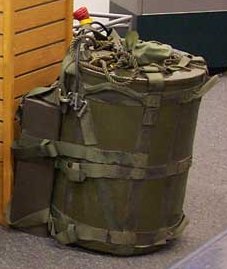Difference between revisions of "Mini-nuke"
| Line 6: | Line 6: | ||
}} | }} | ||
| − | A [[mini-nuke]] is also called a '''suitcase nuclear device''', '''backpack nuke''' or '''pocket nuke'''. In 2001 [[UPI]] reported that [[Alexander Lebed]] testified in 1997 before a section of the House Armed Services Committee, that "perhaps 100 small nuclear devices were missing from inventories under his control".<ref>[http://web.archive.org/web/20070729234432/http://www.upi.com/NewsTrack/Top_News/2001/12/20/fbi_focusing_on_portable_nuke_threat/9007/ FBI Focusing On Portable Nuke Threat] saved at [https://archive.is/20070729234432/http://www.upi.com/NewsTrack/Top_News/2001/12/20/fbi_focusing_on_portable_nuke_threat/9007/ Archive.is]</ref> | + | A [[mini-nuke]] is also called a '''suitcase nuclear device''', '''backpack nuke''' or '''pocket nuke'''. In 2001 [[UPI]] reported that [[Alexander Lebed]] testified in 1997 before a section of the House Armed Services Committee, that "perhaps 100 small nuclear devices were missing from inventories under his control".<ref>[http://web.archive.org/web/20070729234432/http://www.upi.com/NewsTrack/Top_News/2001/12/20/fbi_focusing_on_portable_nuke_threat/9007/ FBI Focusing On Portable Nuke Threat] saved at [https://archive.is/20070729234432/http://www.upi.com/NewsTrack/Top_News/2001/12/20/fbi_focusing_on_portable_nuke_threat/9007/ Archive.is]</ref> However, Siegfried S. Hecker, for the [[Los Alamos National Laboratory]] in a 2002 Russian-American Workshop, organized by [[National Research Council]] and [[Russian Academy of Sciences]], found, that: "the dissolution of the Soviet Union with the consequent loss of order and central government control, especially in the early 1990s, raised the specter of theft or diversion of nuclear weapons or weapons-usable materials from the nuclear complex of the former Soviet Union. Although the “loose-nukes” concern received much play in the American media, it appears overblown. There is no evidence that Russia has lost control of any weapons in its nuclear arsenal.".<ref>https://www.nap.edu/read/10301/chapter/1</ref> |
==Relevant Wikipedia articles== | ==Relevant Wikipedia articles== | ||
Revision as of 02:10, 12 September 2019
(nuclear weapon) | |
|---|---|
 | |
| Interest of | Alexander Lebed |
| A nuclear device small enough to be carried in a backpack | |
A mini-nuke is also called a suitcase nuclear device, backpack nuke or pocket nuke. In 2001 UPI reported that Alexander Lebed testified in 1997 before a section of the House Armed Services Committee, that "perhaps 100 small nuclear devices were missing from inventories under his control".[1] However, Siegfried S. Hecker, for the Los Alamos National Laboratory in a 2002 Russian-American Workshop, organized by National Research Council and Russian Academy of Sciences, found, that: "the dissolution of the Soviet Union with the consequent loss of order and central government control, especially in the early 1990s, raised the specter of theft or diversion of nuclear weapons or weapons-usable materials from the nuclear complex of the former Soviet Union. Although the “loose-nukes” concern received much play in the American media, it appears overblown. There is no evidence that Russia has lost control of any weapons in its nuclear arsenal.".[2]
Relevant Wikipedia articles
Suitcase nuclear device saved at Archive.is
Special Atomic Demolition Munition and Archive.is
Davy Crockett (nuclear device) and Archive.is
W54 and Archive.is
Tactical nuclear weapon and Archive.is
Related Quotation
| Page | Quote | Author | Date |
|---|---|---|---|
| Golan Heights | “But what we also have discovered was that Israel not only has nuclear weapons, but sophisticated tactical nuclear weapons just like we do. Remember the American Army used to have nuclear land mines, for example, all over Germany. Well, the Israelis, we've discovered, have nuclear land mines seated on the Golan Heights and at one point Ariel Sharon, who is, of course, famous for the invasion of Lebanon and whatnot, went to [Menachem] Begin and said, "Look, you're busy," and had a terrible relationship at the time with the chief of Mossad. He wanted to take over sole control of the nuclear button, and Begin, fortunately, said no.” | Leslie Cockburn | 30 July 1991 |
Related Document
| Title | Type | Publication date | Author(s) | Description |
|---|---|---|---|---|
| Document:Dimitri Khalezov Interview | interview | 14 October 2010 | Daniel Estulin Dimitri Khalezov | Daniel Estulin probes the startling claims of Dimitri Khalezov - an ex-Soviet army nuclear weapons specialist - about the events of 9-11 and the then pending extradition of his colleague Victor Bout from Thailand to the USA on arms trafficking charges |